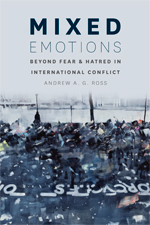A new book by Dr. Andrew Ross, Assistant Professor of Political Science, looks at Mixed Emotions: Beyond Fear and Hatred in International Conflict (University of Chicago Press, 2013).
The book looks at emotions as powerful and creative forces in the politics of terrorism, ethnic conflict, and transitional justice. Approaching emotions as products of social interaction, the book investigates how on-the-ground events such as protests, speeches, and commemoration rituals evoke “circulations of affect” among co-participants. Drawing from neuroscience, the sociology of emotion, and cultural theory, Mixed Emotions makes an original contribution to key problems in IR theory–the changing location of collective agency, the volatile politics of identity, and the sources of justice and normative change.
 “In recent years, it’s become increasingly clear that emotion plays a central role in global politics. For example, people readily care about acts of terrorism and humanitarian crises because they appeal to our compassion for human suffering. These struggles also command attention where social interactions have the power to produce or intensify the emotional responses of those who participate in them,” says the book’s abstract.
“In recent years, it’s become increasingly clear that emotion plays a central role in global politics. For example, people readily care about acts of terrorism and humanitarian crises because they appeal to our compassion for human suffering. These struggles also command attention where social interactions have the power to produce or intensify the emotional responses of those who participate in them,” says the book’s abstract.
“From passionate protests to poignant speeches, Andrew A. G. Ross analyzes high-emotion events with an eye to how they shape public sentiment and finds that there is no single answer. The politically powerful play to the public’s emotions to advance their political aims, and such appeals to emotion also often serve to sustain existing values and institutions. But the affective dimension can produce profound change, particularly when a struggle in the present can be shown to line up with emotionally resonant events from the past. Extending his findings to well-studied conflicts, including the War on Terror and the violence in Rwanda and the Balkans, Ross identifies important sites of emotional impact missed by earlier research focused on identities and interests.” Read more at the University of Chicago Press website.
“This is a big, bold book on an important subject,” writes Janice Gross Stein of University of Toronto in a review. “Andrew A. G. Ross advances novel arguments about emotion as a social process and illustrates his argument through three fascinating case studies. The big picture he draws is compelling and raises large, important questions about how we currently understand global politics. Potentially pathbreaking, the book opens a new field of inquiry which scholars in the field are just beginning to explore in a systematic way.”
Andrew Ross is a broadly trained scholar of international relations, international law, and political theory. He holds a Ph.D. in Political Science from Johns Hopkins University in Baltimore, has taught at the Universities of Oregon and Puget Sound, and has been a post-doctoral fellow at the Mershon Center for International Security Studies at Ohio State University. Dr. Ross is also affiliated with the Center for Law, Justice, and Culture at Ohio University. Andrew teaches courses in international law, international organization, and international human rights, as well as an introductory course in international relations.




















Comments